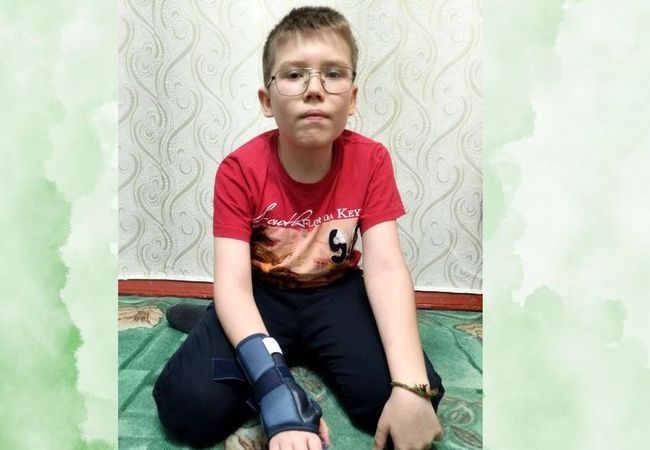Do you have fond memories of your grandmaŌĆÖs kitchen?
My Ukrainian grandma always had something baking and her home always smelled delicious. She was famous for her phenomenal breads ŌĆō banana nut, raisinŌĆ” you name it, she baked it.
After all, Ukraine was the ŌĆ£breadbasket of EuropeŌĆØ. Every holiday, I looked forward to savoring her prize-winning loaves.
I found this old picture of grandma:

I'd like to think I inherited her strength, her big heart... and her big arms :)
I treasured her love. Especially because at Catholic school, they teased me relentlessly. They called me names like: ŌĆ£ShamuŌĆØ, ŌĆ£suck upŌĆØ, ŌĆ£nerdŌĆØ, ŌĆ£Kool Aid manŌĆØ. One of my childhood best friends called me ŌĆ£ogreŌĆØ and even said I was ŌĆ£nothingŌĆØ.
They constantly reminded me ŌĆö I wasnŌĆÖt special; I wasnŌĆÖt different ŌĆöI was broken.
But every day after school, I was embraced by my motherŌĆÖs loving arms and reassuring words of confidence. She protected me.
Little Wings
One day, my mom explained a picture of a guardian angel to me. She said, ŌĆ£She watches over you and protects you. SheŌĆÖs always with you.ŌĆØ

She gave me an angel to wear on my collar to school. When I felt alone, when things werenŌĆÖt going well or when I was sad, I thought, ŌĆ£My guardian angel is with me.ŌĆØ
A few years ago, my mom passed away unexpectedly. It suddenly felt like I was in the air with no safety net, because she was always there for me. I felt painfully alone. Then one day something hit meŌĆ” I wanted to help children who also didnŌĆÖt have a mother.
But how?
By luck, I met Sr Bernarda Arkatin in New York. After a near-fatal car accident 20 years ago, she decided she ŌĆ£wanted to do some good before she left this worldŌĆØ, and started helping orphans in Ukraine.

Sr-Bernarda
She encouraged me to follow my heart.
But the thought of visiting Ukraine alone frightened me. IŌĆÖd be a lost, half-Ukrainian ŌĆ£foreignerŌĆØ who didnŌĆÖt know their language or customs. There was also hardly anything written about Ukraine in English!
I had to do it. My mom left a hole in my heart and I felt Ukraine held some answers. When my plane left the runway, I knew there was no turning back.
To the heart of grandmaŌĆÖs homeland!
I arrived at Kiev, capital city of Ukraine, in the summer of 2011. There, I met Natasha and Tamara for the very first time.
I found Natasha by searching for ŌĆśKievŌĆÖ on Facebook; and Tamara through my friend Kat in New York. They were to be my Ukrainian eyes, ears and mouth.

Berehynia, "hearth mother, protectoress of the home", hovers over Independence Square in downtown Kiev. In 2002, it replaced the huge red marble statue of Lenin
Our mission: to find an orphanage that needed help in 3 weeks.
We visited 15 orphanages. The institutions within 3 hours of Kiev seemed to be doing okay. Some were affluent; some had support from foreign governments; and some even enjoyed overseas summer trips.
Surprisingly, many institutions doubted our intentions and hung up when we called.
3 weeks later, I was discouraged. I didnŌĆÖt feel that we found orphanages that were in great need. Frustrated, I told myself, ŌĆ£If I donŌĆÖt find an institution to visit, IŌĆÖm leaving Ukraine tomorrow.ŌĆØ
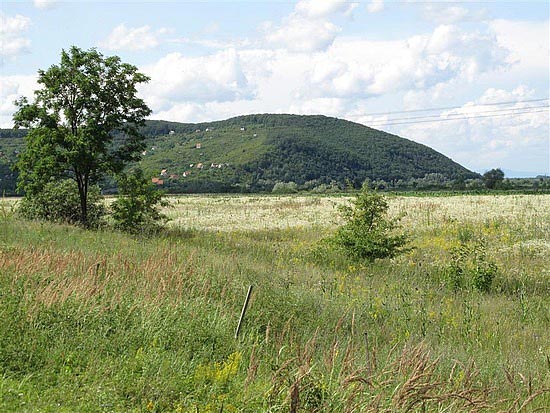
In the country
Then, at 2:00 am that night, I discovered one deep in the Eastern countryside. I jolted Tamara from her dreams:
ŌĆ£Check this outŌĆ” this may be our last shot! Are you in?ŌĆØ
Yes! She agreed.
I didnŌĆÖt realize how remote this orphanage was. It was 15 hours away. The trains were all sold out, so we took the overnight bus, even though I hate buses (I didnŌĆÖt even ride them in Manhattan!).
A friendly stranger
We arrived at Zaporozhye at dawn. Albert Pavlov (the president of Happy Child Foundation) greeted us. His cheerful smile magically fixed our sore, mangled, bus seat-shaped bodies. You know that feeling in your gut that someoneŌĆÖs a good person? Albert had an aura of kindness. ThatŌĆÖs him on the right >
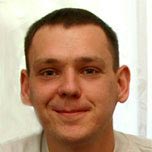
Albert
I learned that he left his software career to devote his life to helping sick children. He has 4 children (3 adopted), and Happy Child serves a critical role in sustaining and transforming institutions in this region.
Actually, ŌĆ£remoteŌĆØ was an understatement. We had traveled so far away from Kiev, we were almost at the Black Sea! It took another 3 hours to reach Kalinovka from the bus station. The road disappeared into a frightfully potholed trail.
The countryside was beautiful, serene and quiet. Grass rustled in the wind and the fields were sprinkled with wild flowers. You could see the horizon in every direction. It was a refreshing contrast to the lights of Kiev.

Where they lay to rest
As we approached Kalinovka, we were greeted by a field of over 400 childrenŌĆÖs graves ŌĆö a chilling reminder that 10% of the children here die yearly, because their disabilities are severe.
When they saw us, their eyes widened with excitement
Finally, we emerged at Kalinovka orphanage ŌĆö an oasis in the Eastern countryside; home to severely handicapped orphans. We were delighted to see the little angels, but I wish you couldŌĆÖve seen their faces when they saw us! It was as if they saw an ice cream truck on a hot summer day.
The children suffered from various neurological and physical disabilities ŌĆō Down syndrome, cerebral palsy, Tetra-Amelia (missing 4 limbs), Arthrogryposis, epilepsy, etc. But they are truly all angels.

Lyosha
On the first day, I took 3 children for a walk outside (a treat since the caregivers were often too busy watching 20-30 children at once to take them out). I was in charge of two able-bodied children and one teenager in a wheelchair. I should be able to handle this, right? What could go wrong?
I pushed Lyosha in his wheelchair. Sometimes, IŌĆÖd run, and little Vanya and Yura would run with me and hold my hand. After 10 minutes, we passed an open field. We had been dancing, singing songs together, enjoying a Disney moment, when suddenlyŌĆö to my horror ŌĆöYura decided to run.
Yura!
Yura zipped off like a bandit. He enjoyed being chased and he was laughing, while I was having a heart attack. I left Aloysha and Vanya with Tamara and Yaroslav in a hurry, and raced through the village screaming ŌĆ£Yuraaa!!!!ŌĆØ
Finally, I caught the little misfit. He was laughing and smiling and he had no idea how worried we were. I couldnŌĆÖt live with myself if I lost one of them. Unfortunately, I couldnŌĆÖt communicate to Yura in Russian, but he loved that we played chase, because he rarely got to.

Yura the bandit
So I learned my lesson. I decided I could only handle a few children at a time. I would take 3 children, Tamara would take 3, Yaroslav would take another 3, and his sister would mind the others.
I couldnŌĆÖt imagine one caregiver watching over 10 children with special needs at once and giving them the motherly attention they needŌĆ” yet this was what they had to do every day.
When I watched the caregivers tend to the bedridden children, all I could think wasŌĆ” they needed TWENTY more caregivers. But because they are understaffed, even the able-bodied children are confined to certain areas and rarely get to go outside.
A childŌĆÖs pure and fearless love
I didnŌĆÖt speak Russian or Ukrainian, but there was no real barrier. ItŌĆÖs hard to explain. They wanted to be loved ŌĆö held, carried, smiled at and hugged.
So, as much as they loved their freedom and the adventure of our walks, they didnŌĆÖt like to stray. One child always held my hand and if I put my arms out ŌĆö he would immediately latch on and cling to my side.
There was one particular child who stole my heart.
His name is Vanya.

Vanya and Vladik
Vanya is 7 years old. He has Down syndrome; the courage of a fighter and the energy of an Olympian. He was often bullied because he was smaller and weaker than the other children.
But he is always smiling and laughing, and overflowing with love. I felt a motherly bond with him and always wanted to hold his hand and carry him. You see, the caregivers didnŌĆÖt always have time to pick up the children or hug them.
Vanya loved when I gave him kisses. HereŌĆÖs a picture we took where I kissed him on the cheek, and you can see how happy he was. In fact, that particular picture brings so much emotions for me, that whenever I am having a tough day in NYC, I look at it and I think, ŌĆ£Vanya is out there. Life is beautiful.ŌĆØ IsnŌĆÖt he the cutest?

Kisses for Vanya
Vanya would excitedly tell me many things in a mix of Russian and Ukrainian. I couldnŌĆÖt understand any of it, but I would nod to show him I was listening.
It was sweet to see him run to me. He was a free spirit who wanted to enjoy nature, summer, and his friendships with the other children.
I never saw him as a boy with a disability. To me, he was exceptional and perfect. His smile and energy brought life to Kalinovka.
Tamara, on the other hand, bonded with Yura. Yura acted like a diplomat, a little adult of the world. He made serious expressions and on our walks, he showed the grounds and explained to me in his Russian/Ukrainian all the wonders of Kalinovka.

Tamara, Yura and Vanya
Yura was proud of his home. It was all he knew and he wanted to share it with us ŌĆö He was Yura, ambassador of Kalinovka.
Next, meet Artem. Artem often stayed in one place on the ground. He watched as the other children ran around. To move around, he would crawl using his upper body and drag his heavy legs. It was the only way he felt comfortable.
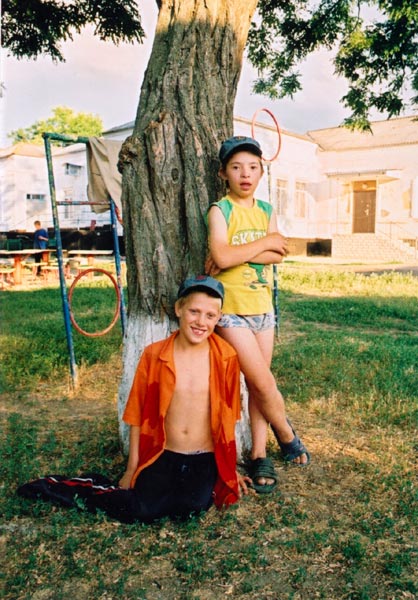
Artem and Ruslan
When the ground has rocks or sticks, he would scrape his legs if they were partially exposed. Sometimes, his pants would come off. I had such pity for him because he couldnŌĆÖt easily pull up his pants since all his weight was on them. Yet as I look at his picture and his beautiful pose, he looks like any normal, beautiful, smiling child.

Lyosha loves to string beads. He has difficulty holding a spoon because his motions are jerky and awkward. His head is always slightly cocked back. At class, when the teacher places a dish with tiny beads before him and puts a string in his hand, a miracle takes place. No one ever believes what happens next. He places beads onto the string. One after another. An unbelievable expression appears on LyoshaŌĆÖs face. He pours his soul into this flower, each petal of which he threaded and tied himself! What pride in his eyes! ŌĆ£I did it myself! I was able to! Look at me ŌĆō I can do this!ŌĆØ
Yaroslav spent a lot of time with Lyosha and explained how smart he is. Lyosha barely spoke, and he expressed himself through his eyes. I used to stroke his face and his eyes expressed real happiness and comfort. To see that look would melt the coldest heart.
The children who can walk help the ones who canŌĆÖt. Not every child could steer a wheelchair carefully, without getting stuck in narrow places. Sasha is especially responsible and conscientious. He pushes Aloysha in his wheelchair, like an older brother.

Sasha pushes Alyosha
Aloysha, on the other hand, does not have proper arms and legs; but he is very intelligent and a leader of his group. He moves very quickly, rolling like a breakdancer.

Alyosha hammering
You can see his resourcefulness and determination when he plays with his toys. In the picture on the right, he is hammering plastic rods, and in the video below he is practicing with crayon and paper:
They are amazing. I wish they all knew: ŌĆ£You are special. YouŌĆÖre not broken.ŌĆØ
What Kalinovka brought to my attention is the neglect towards mentally and physically disabled children. I often found that the ŌĆ£regularŌĆØ orphanages received a lot of ŌĆ£material aidŌĆØ, but Kalinovka lacked in overall care.
My visit reminded me of my childhood, when the children tormented me at school. They made me feel like an outcast and a reject. But I realizedŌĆ”
That was nothing compared to what these children suffered
I was upset to learn this about the children at Kalinovka:
They were abandoned by their own mothers and banished to a remote village, far away from the capital city. I discovered that many people considered mental disabilities a curseŌĆ” and most babies that have them are left at hospitals, and ultimately end up at orphanages. Did you know that?
How could their mothers abandon them, when their hearts once beat only inches apart?
Most of the children have grown up starving for love; aching for the gentle touch, a compassionate ear or a soothing voiceŌĆ” but defiantly, their spirits remain unbroken.
And guardian angelsŌĆ” these children have guardian angelsŌĆ” they are real! Not like the pin I had on my collar ŌĆö theyŌĆÖre REAL.
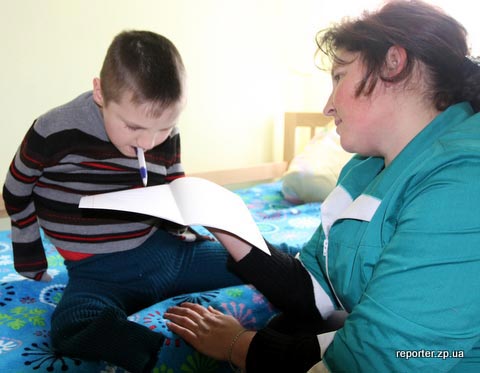
A caregiver is like a mother and teacher to the children
TheyŌĆÖre the women who feed them, clean them, carry them, teach them and care for themŌĆ” every day!
They survive because of their Guardian Angels ŌĆö their caregivers; their visitors; people like you and me, and strangers they may never meet.
But most importantly, they survive because of their courage ŌĆō
They refuse to stop loving.
So that was my adventure in Ukraine last year. That was how I met angels like Vanya and Katya, who inspired me to do something to help. I hope you enjoyed this rare glimpse into the lives of the angels in the countryside ŌĆö the brave children who continue to love fearlessly

Vanya


Oleg



Maya with Seriozha

Vanya&Maya

Lyosha
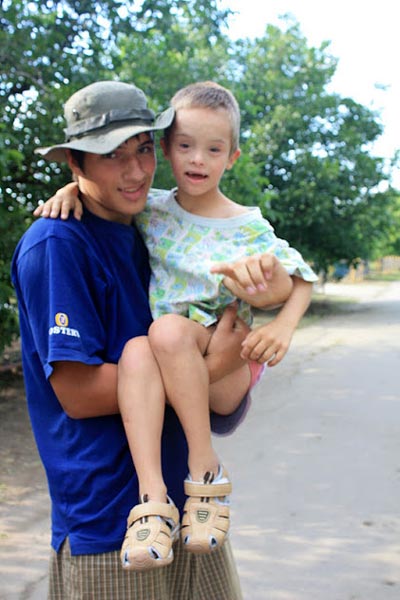

Special message
A chance to give these
children (and this story)
a happy ending!
We have an important message. WeŌĆÖre helping Happy Child Foundation spread the word: they need another caregiver to join the childrenŌĆÖs home at Kalinovka.
Believe it or not, the children featured above are the healthier ones. You didnŌĆÖt get to see the children who are too sick to be taken outside or confined to bed ŌĆö those are the children who need urgent help.

A caregiver multitasking in the bathroom
IŌĆÖm not going to torment you with depressing pictures, because I donŌĆÖt think itŌĆÖs right to bully people that way.
Instead, hereŌĆÖs the assessment of a pediatrician who visited Kalinovka:
Among several children, hypotrophy (degeneration of organs and tissues) is present to a profound degree. The reason is not that there isnŌĆÖt enough nutritious food. ItŌĆÖs because itŌĆÖs impossible for the children to take in and digest food, due to the type of diet and feeding practices they receive.

There are no ramps or lifts
One caregiver must feed 13 to 17 children at once. Because of the severity of the disabilities and diseases, properly feeding a large number of patients is difficult. For several children there may be problems with chewing and swallowing; or food is received but not digested.
As a result, the children become weak ŌĆö those who can move, crawl with greater difficulty; and those who once crawled stop moving altogether.[1]
They need more caregivers!
If youŌĆÖd like to join us to help the children, here are 4 things to consider.
You should NOT help if:
1. You want the children to be kissed and read bedtime stories
With one additional caregiver, that will still not happen. To put things into perspective: many children do not get to go outside for years.
This is why the children were overjoyed when we visited ŌĆö it meant they had a chance to go outside.
On the other hand, many children cannot move on their own or are confined to bed. For them, more critical than getting fresh air is having a caregiver shift them around to avoid bedsores.
2. You want publicity, fame or recognition
The children may not be able to thank you, and hardly anyone will know what you have done for them. There will be no reward, except for the knowledge that you are these childrenŌĆÖs secret angel.
3. You believe the children have other options
The children have severe disabilities and, sadly, most will never get adopted. They receive limited financial help from the government and their current budget does not allow for additional caregivers to give them the care they need (which for many children, can be the difference between life and death).
The caregivers are the closest to a family they have left. And the caregivers need help.
Unless someone like you cares a whole awful lot,
Nothing is going to get better. ItŌĆÖs not.
4. You have to make sacrifices to part with 67 cents a day
Another caregiver with experience and training for special-needs children will be $200 a month. ItŌĆÖs a significant amount, especially in this economy; but since the children canŌĆÖt wait for the economy to get better, weŌĆÖre trying something different:
67 cents per day, per person ŌĆö less than a pack of gum, a bottle of water or a chocolate chip cookie at Starbucks; less than what it costs to remove the ads in Angry Birds or Draw Something, or to buy a cow in Farmville.
How can this work? Through the power of cooperation! At 67 cents per day, it only takes 10 people to bring another loving caregiver to the children, and give one woman from a nearby village income to provide for her own family.
Help the children for as long (or short) as you want to ŌĆö this does not have to be a lifetime commitment. If you choose to stop for any reason, we will respect your decision and your privacy.
Just know that any little bit of help these children get from you, is help they would not get otherwise. It will be appreciated and it will make a difference.
Individually, we are one drop.
Together, we are an ocean.
Stop
f youŌĆÖve ever been bullied before, you probably know that feeling of being helpless. Or feeling angry you let yourself get hurt, even when they say you should just be strong and shrug it off.
I hope someone or something gave you peace. For me, it was my mom and grandma. For these childrenŌĆ” they have no family. So, if youŌĆÖve ever wished you had the power to defend those who cannot defend themselvesŌĆ” hereŌĆÖs your chance.
If youŌĆÖd like to be one of the ŌĆ£guardian angelsŌĆØ to the children at Kalinovka and help improve their lives permanently, for only 67? a dayŌĆ”
ŌĆ”on behalf of Vanya, Yura, Lyosha, Artem, Aloysha, Sasha and the other children ŌĆö Thank You, Thank You, Thank You and Congratulations! Please write to me right away at: maya@mayashope.org!
Stay tuned for Episode 3, where weŌĆÖll reveal the ending to this story!
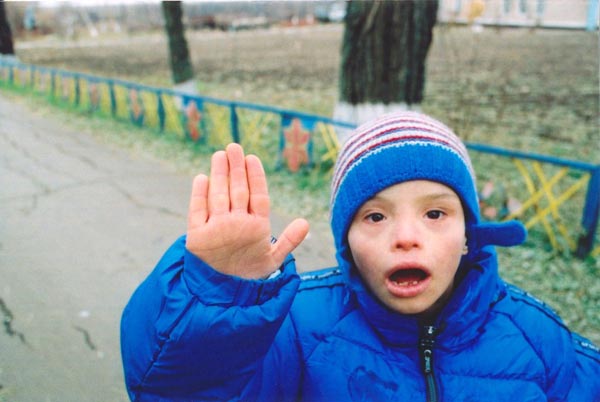
High-Five Vanya!


